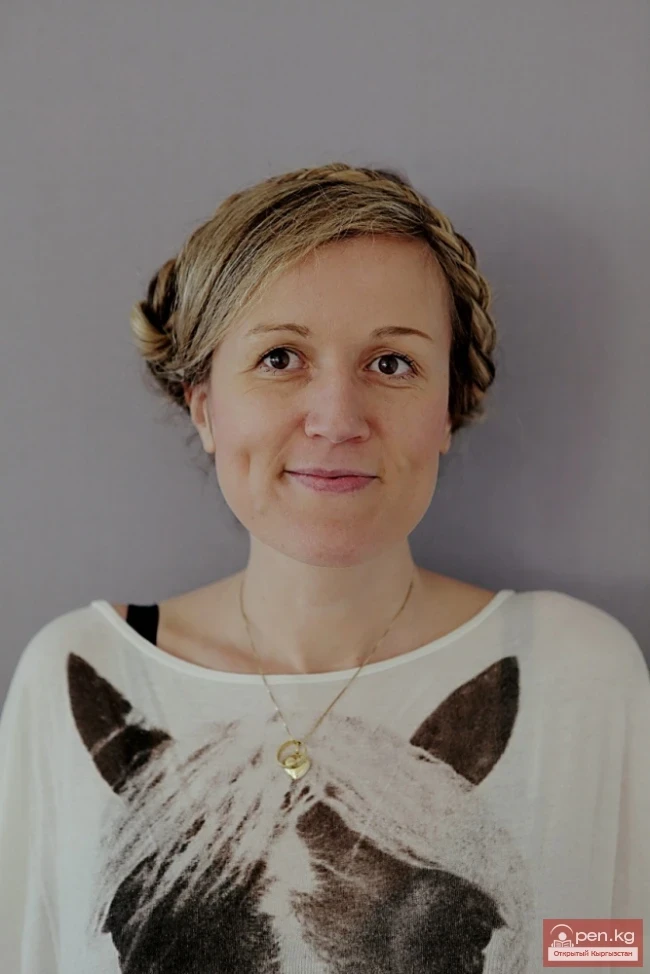Austrian Writer Spent Entire Prize on a Book About Kyrgyzstan
Famous Austrian writer Daniela Emminger visited Kyrgyzstan, and she will dedicate her new book to our country. The editorial team decided to find out what attracted the Austrian to Kyrgyzstan and what she wants to tell about it in her new work.
- Daniela, tell us a little about yourself and how you ended up in Kyrgyzstan.
- I live and work in Vienna. I graduated from university with a degree in "marketing and communications." My first novel Leben für ("Life for Beginners") was published in 2004. It’s about finding your place in life, your calling, and how to fight for life. Since 2008, I have completely dedicated myself to writing. Since then, my work Schwund ("Loss") has been published. It is a story about a woman whose mother was dying. Ultimately, the daughter took her out of the hospital, knowing that her loved one's days were numbered. Together, they made one last journey to get to know each other better.
I also have several unpublished works. For example, in August, a book titled Die Vergebung muss noch warten ("Forgiveness Must Wait") will be released. In it, I tried to share my view on the balance of justice in the world. I explain the concept of karma, that in life, a person must behave conscientiously because by the end of their days, all sins will be repaid. The work has three main characters: a woman in a midlife crisis, a man who was in prison, and a talking dog. There are many negative characters, and the meaning is that forgiveness must wait because they have done a lot of harm to people.
Currently, I am writing a book about Kyrgyzstan titled Die Kunst des Verlierens ("The Art of Losing"). This is why I came to your country. In 2016, I also plan to release a novel titled "Never Ending" - a story about unrequited love. The book is written; it just needs to be published.
- What will the book "The Art of Losing" be about?
- I wanted to write this book about the feeling of being lost that a person experiences when they lose something or simply feel detached from the world and society. When the idea for the novel came to me, I decided to travel to a country where I could fully feel this. I don’t know Russian or Kyrgyz, I don’t even know Cyrillic, I have no one here, and I wanted to experience that feeling of being lost and isolated as a foreigner. This feeling is what the book is dedicated to, and I decided to invest all the literary prize I received earlier into it.
I was sitting at my computer, choosing which country to go to. I was selecting from those I knew nothing about. When I looked at photos, I came across a picture of Son-Kul. And I immediately felt intuitively that this was the country. Mountains, nature, unfamiliar culture... The very place where one can feel maximally alone.
Kyrgyzstan is also very interesting because it is a young country. I delved into my studies and really liked it. I was intrigued by how different presidents came and how they influenced the country, how the country is changing now, and what prospects it has. I am particularly fascinated by the process of transitioning from the past to the future.
- So there will be elements of a historical novel?
- The book has two parts: the first is historical, based on real events, and the second is from the author. It narrates about the year 2015, modern times. There are two main characters in the book: in the first part, there is a boy named Samat – half Kyrgyz, half Austrian. Once, his mother fell in love with a Kyrgyz guy in Moscow, but she was not happy there and did not want to stay, so she divorced and flew back to her homeland – Austria, taking her son with her. It seems unusual for a son to be taken away from a Kyrgyz man, yet she did it. The boy grew up in Austria. When he turned 18, he found documents, learned about his past, and decided he needed to know more. For this, the boy traveled to Kyrgyzstan in the 80s, even before the collapse of the Soviet Union, and he stayed in Kyrgyzstan.
But in Austria, Samat has a close friend named Suuzar. I want to emphasize that this is not a love story, but a true friendship. For 25 years, Samat writes her letters. These letters form the basis of the historical content. Thus, what is happening in the country is revealed through the letters. The plot is not based on the lives of real characters, but rather on actual events, changes in power – all of this is told through the letters.
But there is another point: when Samat starts writing to Suuzar, she has just turned 14, and her parents do not show her his letters. Therefore, she does not read them, but Samat continues to write. Over time, Suuzar gets an education, gets married, but her husband dies. Suuzar is in a terrible state: she does not want to live anymore. By that time, Samat's letters are already with her. After bouts of despair, Suuzar begins to familiarize herself with their content. As a result, the girl decides to travel to her childhood friend in Kyrgyzstan. And it is already 2015. In the second part, the narrative in the present time tells about Suuzar's adventures. She arrives in the country and tries to find Samat at the last addresses written on the envelopes of the letters. Here begins something like a detective story. I won’t reveal the ending, or it will be uninteresting.
- Did your family let you go freely to a country they don’t know?
- They did not react very well because almost no one in Austria knows about this country. My father said I was crazy. But now my husband is also interested in your country. I think other Austrians who have not heard of Kyrgyzstan will find something new in the book.
- Weren't you afraid to go to a post-revolutionary country?
- Yes, I was afraid, but I am quite mature. I kept in mind that I had to do this, and besides, it is quite calm here at the moment, as a lot of time has passed.
- How long did you travel around Kyrgyzstan with your heroine? What are your impressions of the country?
- I spent two months in Kyrgyzstan. I spent another month conducting research before arriving from Austria. I initially planned for it to be a standard 300-page novel. Now I already have 150 pages and I realize that I am just at the beginning. The novel will be much larger, and I plan to return here in March 2016 to continue my work.
I found one word that describes Kyrgyzstan well – "contradiction." Alongside some wonderful things, there are also those that I do not like at all. I was in the south and in the north, visited different universities, spoke with people, and came to the conclusion that many people simply do not know who they want to be. For example, they have not defined their religious beliefs, or often do not fully understand the essence of religion. Or, for instance, people try to be modern, but at the same time, traditions like bride kidnapping still exist. The knowledge I gained about life in the country, traditions, and customs is used episodically in the novel. It is not the main plotline, but it paints the overall picture of the country.
- You mentioned that you were in the north and south, but where exactly?
- My main base was in Bishkek. I also traveled around Issyk-Kul. There was an interesting moment that I use in the novel: I noticed a poster of Yuri Gagarin at one of the abandoned gas stations. It was put up by an elderly Kyrgyz woman who told me that during Soviet times she worked in a sanatorium on Issyk-Kul, and Yuri Gagarin came there after his space flight to recuperate. He joked, telling her that he saw Kyrgyzstan from the Moon, and it looked like the face of a tiger, and Issyk-Kul was the blue eye of that tiger. Therefore, upon landing on Earth, Gagarin supposedly wanted to be there. This is probably not true, but it is a legend.
I was in the Naryn region. They just took me there and left me. I stayed with a Kyrgyz family in a yurt, and we communicated using sign language.
- What did you like most about Kyrgyzstan and what did you not like?
- I love everything and nothing here. It’s hard to answer this question. When I arrived, I noticed that there was a lot of dust around, it was hot. People are not very welcoming; they are all introverts, walking alone. Compared to Austria, it is simply not as clean here. But now that I have been here for two months, I walk down the same street and think: "What a wonderful street!" I am already satisfied with everything; I feel comfortable.
Recently, there was an incident: on Chuy Avenue, there was heavy traffic, and two elderly Kyrgyz women were standing and could not cross the road. I guessed from the situation that they needed to cross the street, took both of them by the arm, we crossed the road, and they showered me with thanks: "Rakhmat, rakhmat!" I felt like a part of the city, a city dweller, a Bishkek resident.
As for the cuisine, I tried everything – even the head and eyes of a sheep. I liked kumys, "Maksym shoro," and I rolled kurut myself at Son-Kul. I like lagman, besh-barmak. But during my entire stay in Kyrgyzstan, I ate so much meat that now I want to be a vegetarian for a while.
Source: vb.kg
Read also:
The Beautiful Country Known as Kyrgyzstan
Kyrgyzstan is a small country bordering Uzbekistan, Kazakhstan, and Russia. The main attractions...
Japanese song dedicated to Kyrgyzstan
A Japanese song in the traditional Japanese genre of "enka," titled "Wanderer of...
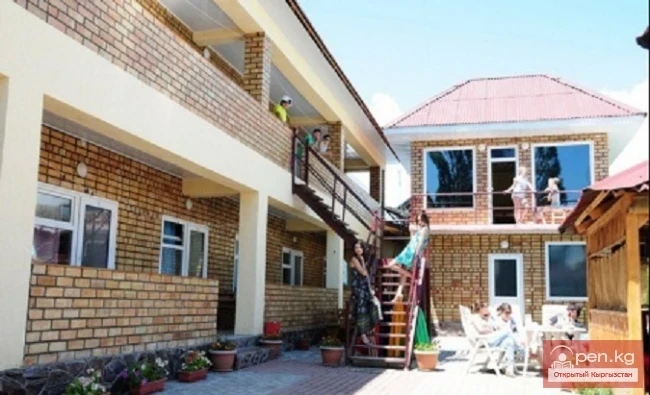
Hotel "Love Story"
Hotel "Love Story" on Issyk-Kul The hotel with the incredibly beautiful name Love Story...
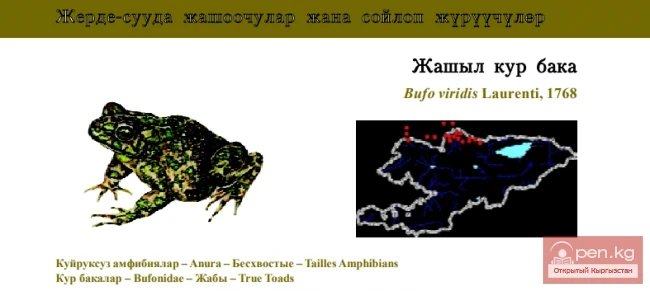
Central Asian Frog / Kyzyl Koltuk Frog / Middle Asia Wood, or Asiatic Brown, Frog
Central Asian Frog Status: Category VUB1ab(iv). A mosaic-distributed species with a disjunct and...
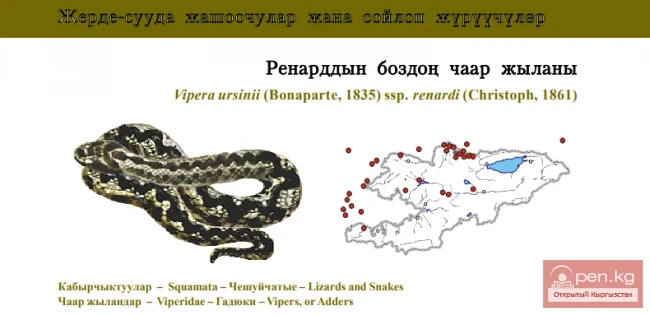
Renard's Meadow Viper
Renard’s Meadow Viper Status: Category VUA4bc. A subspecies of the south-west Palaearctic species,...
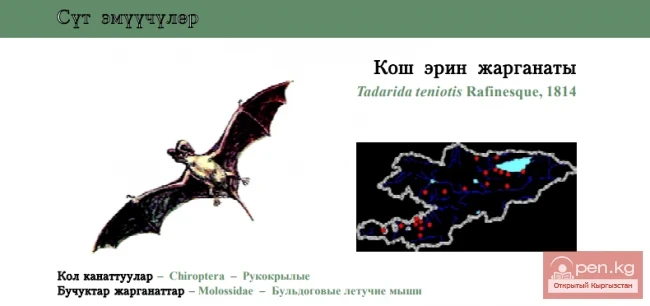
Broad-eared bat / Erin's bat / European Free-tailed bat
Broad-eared bat Status: Category VII, Lower Risk/least concerned, LR/lc....
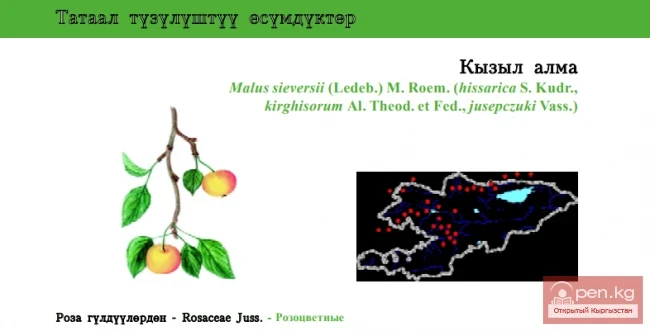
Sievers’s Apple-tree \ Kyzyl Alma \ Sievers’s Apple-tree
Sievers’s Apple-tree Status: LC category. A polymorphic species of the mountain-central Asian...
Enduro Motorcycle Journey in Kyrgyzstan. Enduro Kyrgyzstan
Motorcycle Journey Enduro Kyrgyzstan. Enduro Kyrgyzstan...
Terskey Alatau, Tian Shan
Journey through the Terskey Alatau and Tian Shan...
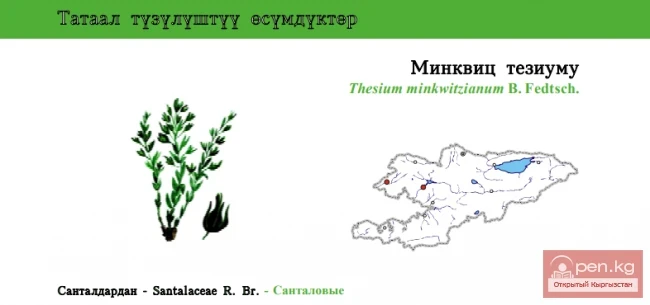
Minkwitz's Bastard Toad-Flax
Minkwitz’s Bastard Toad-Flax Status: CR. Subendemic. An extremely rare relict plant that is...
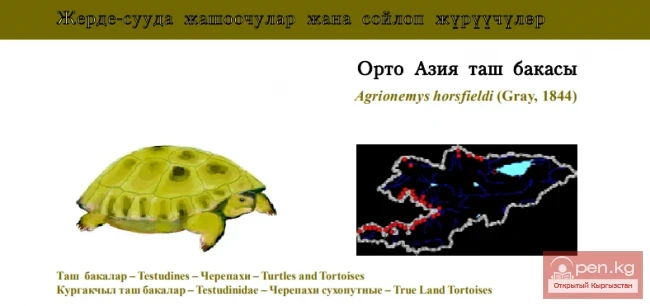
Central Asian Tortoise \ Orto Asia Tortoise / Steppe, or Afghan, Tortoise
Central Asian Tortoise Status: VU Blab (ii, iii, v); Cl. A representative of a monotypic genus,...
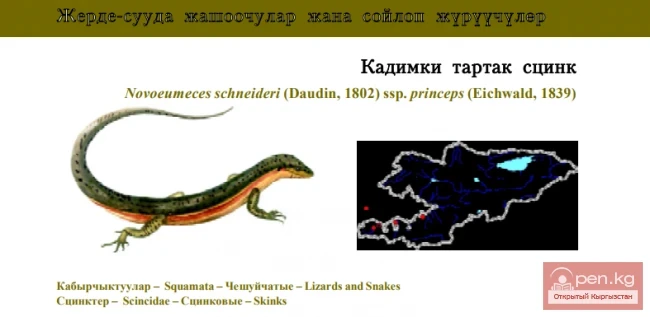
Schneider's Gold Skink / Kadimka Tartak Skink
Schneider’s Gold Skink Status: Category ENB1ab(iii). A sporadically distributed south-Turanian...
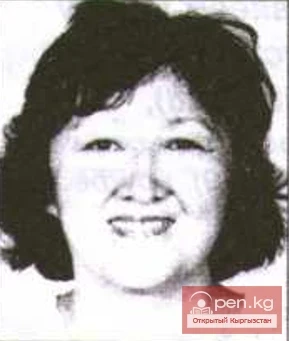
Karasaeva Altynai Khuzeinovna
Karasaeva Altynai Khuzeinovna (1939), Doctor of Medical Sciences (1985), Professor (1993) Kyrgyz....
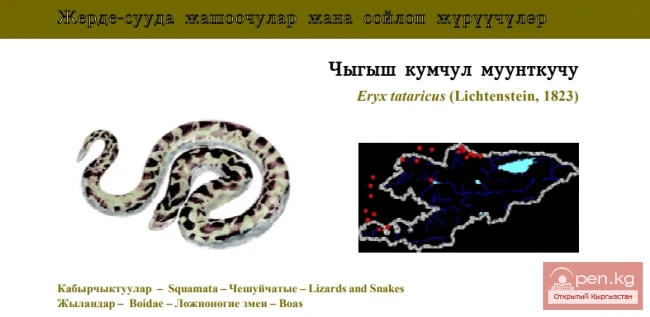
Eastern Sand Boa / Chygys Kumchul Muuntkuchu / Tatary Sand Boa
Eastern Sand Boa Status: Near Threatened (NT). One of 10 species of the genus, which includes...
Manas Airport. Bishkek. Kyrgyzstan.
Airport Manas. Bishkek. Kyrgyzstan. Kyrgyzstan. Bishkek. Airport Manas...
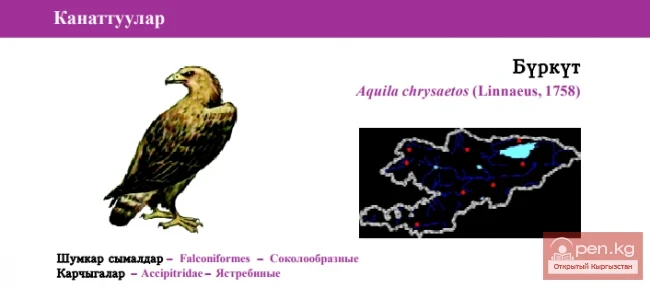
Berkut \ Burkut \ Golden Eagle
Berkut Status: VI category, Near Threatened, NT: R. One of four species of the genus in the fauna...
Cheerful Kyrgyzstan - Веселый Кыргызстан
An alternative for the tourism video of Kyrgyzstan. This video was shown in Sochi, where our...
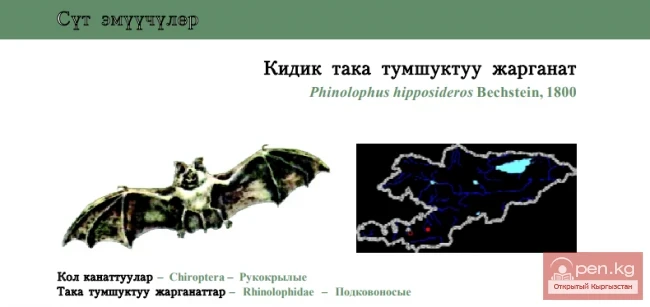
Lesser Horseshoe Bat / Kidik Taka Tumshuktyu Jarganat / Малый подковонос
Lesser Horseshoe Bat Status: Category VI, Near Threatened, NT: R. A species with a declining...
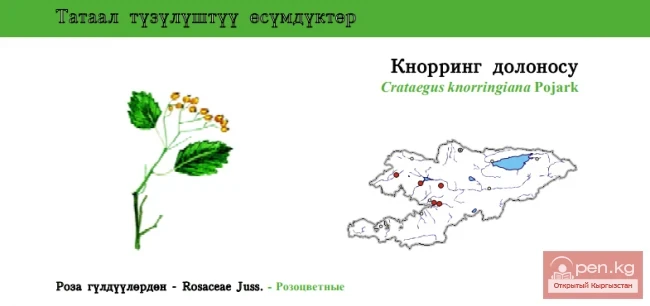
Knorring's Hawthorn / Knorring's Dolenos / Knorring’s Haw-tree
Knorring’s Haw-tree Status: VU. A narrowly endemic species....
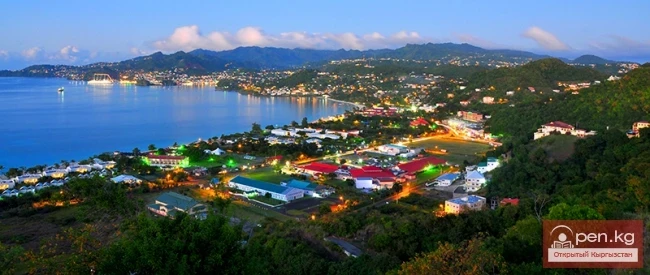
Grenada
GRENADA A country on the eponymous island and two islands from the Grenadines group in the Lesser...
Dedicated to everyone who lived in Bishkek! Bishkek, Kyrgyzstan, Kyrgyz Republic, city of Bishkek
Bishkek, Orto-Tokoy Reservoir. September, 2013....
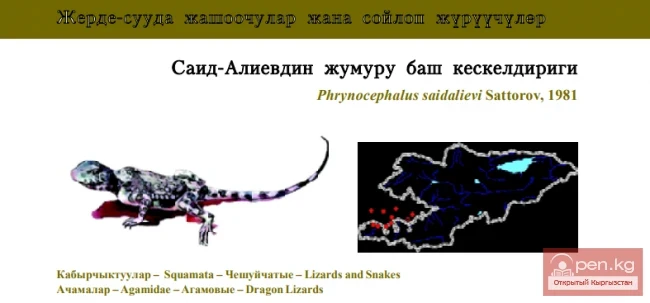
Said-Aliev's Round-Headed Agama / Said-Aliev's Toad Agama / Said-Aliev’s Sunwatcher
Said-Aliev’s Toad Agama Status: Vulnerable (category VUBlab(iii)). A narrowly distributed relic...

Pink Tulip / Little Red Mandala / Pink Tulip
Pink Tulip Status: EN. A narrowly endemic species of the foothills of the Turkestan Range, sharply...
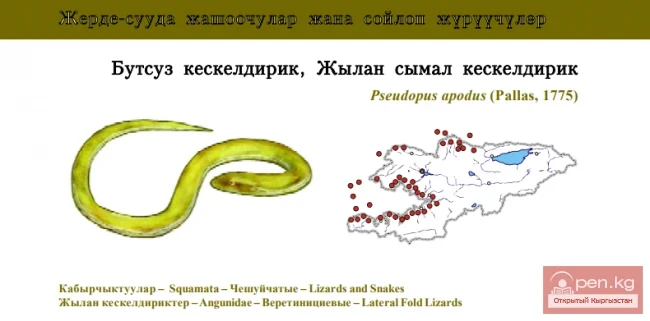
Yellow-bellied Skink / Butsuz Glass Lizard, Snake-like Glass Lizard / Sheltopusik, or Armour Glass Lizard
Sheltopusik Status: Near Threatened (category NT). A rare widely distributed representative of a...
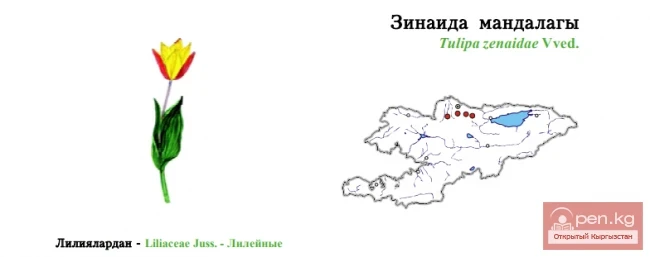
Zenaida's Tulip / Zinaida Mandala
Zenaida’s Tulip Status: VU. A narrowly endemic species of the Kyrgyz Ridge, at risk of rapidly...
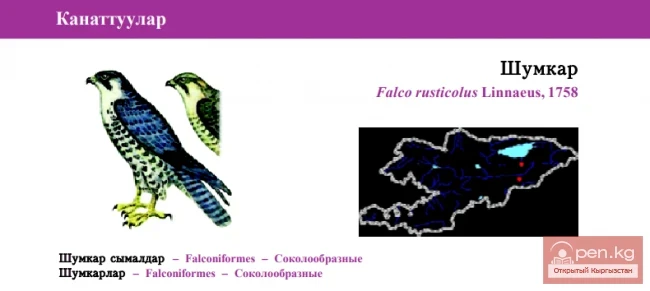
Krechet / Shumkar / Gyrfalcon
Gyrfalcon Status: Category VII, Least Concern. One of 10 species of the genus in the fauna of...
Karakol. Terskey Ala-Too. Backcountry and Freeride in Kyrgyzstan.
Russian fans of extreme freeride and backcountry made an introductory video about Karakol and...
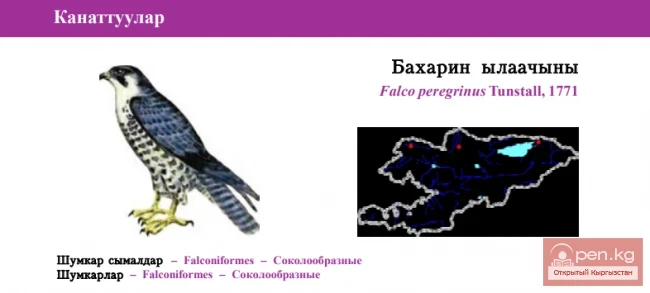
Saker \ Bakharyn ылaaчыны / Peregrine Falcon
Peregrine Falcon Status: Category VII, Least Concern, LC. One of 10 species of the genus in the...
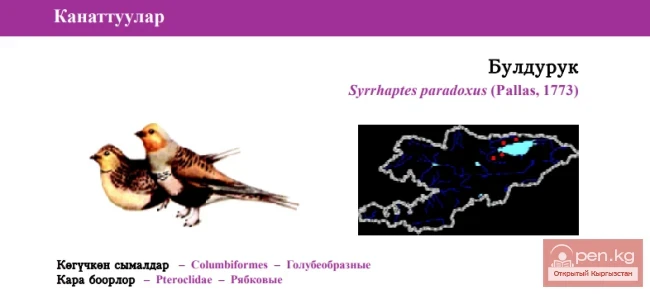
Saja / Bulduk / Pallas’s Sandgrouse
Sadzha Status: V category, Vulnerable, VU: R, Monotypic species....
Milan Expo 2015 Kyrgyzstan
The World Expo 2015 in Milan, unofficially "Expo 2015" (Italian: Esposizione Universale...
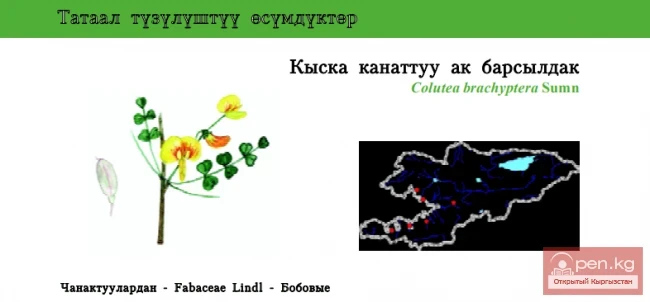
Short-winged Bladder-senna / Baibiche Chekey
Short-winged Bladder-senna Status: VU. One of three very rarely occurring species of this genus in...
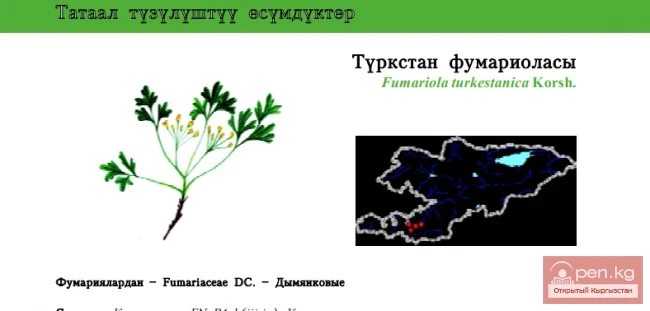
Turkestan Smoke Plant / Turkestan Fumitory / Microfumitory
Turkestan fumitory Status: Category ENBlab(iii,iv). A representative of the monotypic [60,...
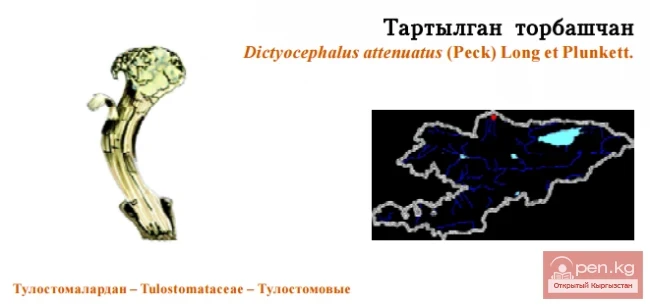
Tapered Net-cap
Tapered Net-cap (Dictyocephalus attenuatus (Peck) Long et Plunkett). Status: VU. A very rare...
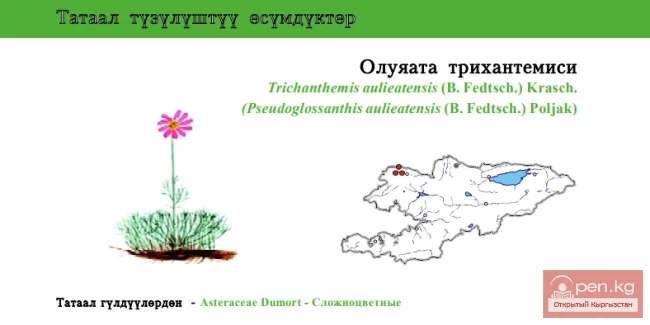
Hairy-flowered Aulie-Ata / Oluyaata Trichanthera / Aulie-Ata Pseudoglossanthis Centaury
Hairy Flowering Plant Aulie-Ata Status: EN. A representative of a monotypic section, a narrowly...
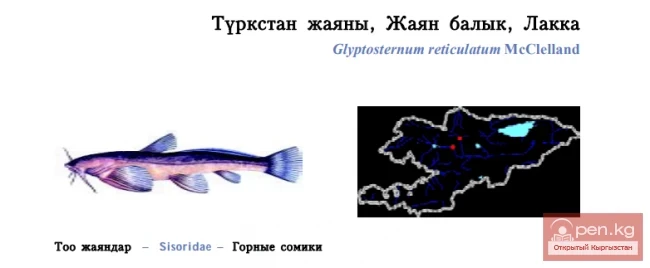
Turkestan Catfish / Turkestan Zhayany, Zhayany Fish, Lakka
Turkestan Catfish Status: 2 [VU: E]. The only representative of the genus in Kyrgyzstan....
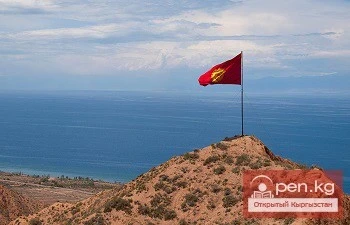
National Geographic Traveler included Kyrgyzstan in the top twenty travel destinations of 2016.
Kyrgyzstan has been included in the top twenty tourist destinations of 2016 by National Geographic...

Types of Insects Excluded from the Red Book of Kyrgyzstan
Insect species excluded from the Red Data Book of Kyrgyzstan Insect species excluded from the Red...
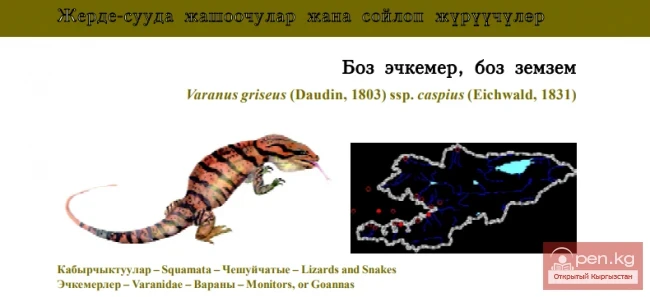
Gray Monitor / Boz Echkemer, Boz Zemzem / Transcaspian Desert Monitor
Gray Monitor Status: Category CR A4bc; E. In Kyrgyzstan - fragmented populations of the declining...
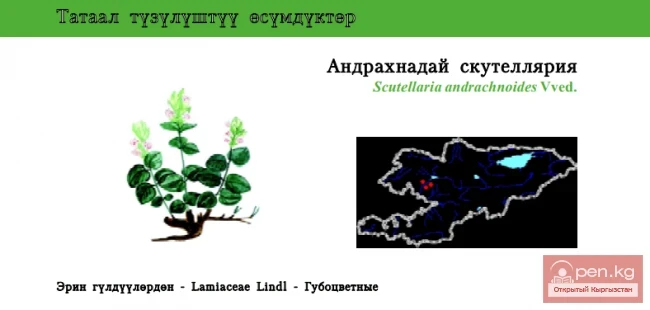
Andrachne-like Scullcup / Andrachne-like Helmet
Andrachne-like Scullcup Status: VU. A very rare rocky species, narrowly endemic to a small section...
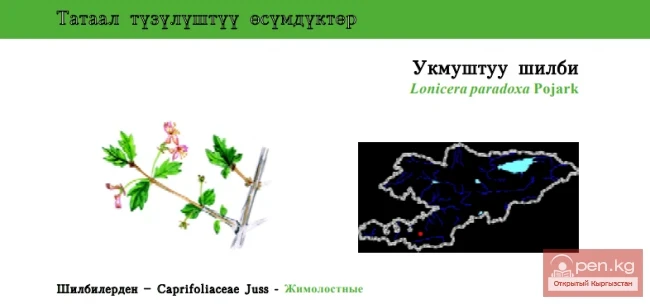
Strange (Paradoxical) Honeysuckle / Укмуштуу шилби / Paradoxical Honeysuckle
Paradoxical Honeysuckle Status: Category CR B2ab(iii). A relict endemic species with a disjunctive...
Dance Flash Mob in Support of Social Justice in Kyrgyzstan
Popular dance teams Tumar, Let's Dance, and dancer Jan Voinov participated in a flashmob...
Beauties of Kyrgyzstan
Beautiful Kyrgyz women, winners and participants of beauty contests, models, actresses, and simply...

Kyrgyzstani Alexander Zelichenko won a prize in a literary competition in the United Kingdom.
Writer from Kyrgyzstan, police colonel Alexander Zelichenko took second place in the literary...
